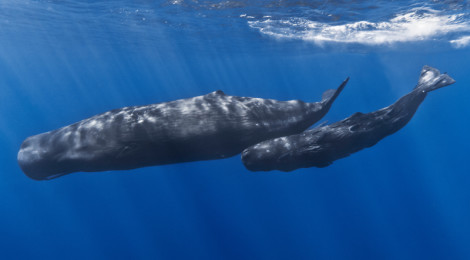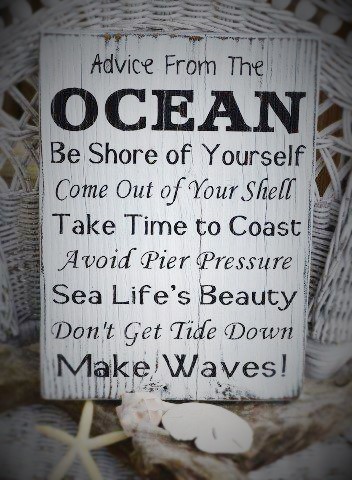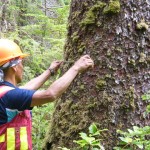
Whale Children Babble As They Learn To Talk Just Like Human Kids
Listening to our babbling babies learning to talk is one of life’s great joys.
We are not alone!
Researchers from several nations have reported in a recent paper on the behaviour of giant Sperm Whales, think Moby Dick. One of the remarkable things reported is how whale children babble and about how these giants of our ocean pastures enjoy being parents, just like we do. It seems the whales have complex language that they teach to their children as babies, and it takes some doing that is its own reward. Smiling gurgling baby whales only slowly learn to talk and while learning their parents and extended families are adoringly patient.
Of course the researchers put their own spin on the description of whale behaviours referring to it as “the culturally transmitted dialects of their signals confer on the whales a language of ‘codas,’ signals transmitted across vast distances acoustically. 9 social units of Physeter macrocephalus living in the Caribbean were studied for 6 years, to discover the extent to which codas were different or shared.” Whew.
The researchers also investigated how the complexity of social structure could drive the evolution of an advanced communication system. Countless land animals including birds, bees, bears, bats, monkeys and mongeese, stoats and weasels have been investigated in similar ways. One only need to browse the children’s books section of any book store to see such ‘studies.’ The ever-present history of mankind described as a ‘scientific hypothesis‘ is that ‘more complicated signalling will evolve as any society finds a need for more social interaction”.
Oceans Are A World Where Sound Rules Over Sight
Whales enjoy the ocean medium, water, as a wonderful acoustically rich environment as sound transmits far more effectively and efficiently in water. It is no wonder that whales have evolved and developed a rich and complex aural nature that is fully integrated into every aspect of their nature, nurture and culture.
Our ancient human ancestors likely performed and evolved in similar ways as we prowled the forests and savannahs. Our development of social signalling, from grunts to words to tweets proved immensely valuable between our teams
of vocal, visual, tactile and even olfactory kin. The ocean habitats vast expanse is far more suited and thus facilitating for the use of sound which whales use for finding their food, sending long distance news of the finding of rich ocean pastures to distant relatives over distances of thousands of miles and of course just yakking. Whales evolved in a world with a high bit rate global internet from the very beginning!
The sperm whale it seems is especially chatty and might just have a cooperative group ethic is at least as complex as our own species, especially among the hierarchies of especially chatty females in the extended family groups. Who would have known such a thing?
Whales send regular family id codes, (or ip addresses for those of us who are geeks).
Three or more broadband clicks function as a single coda for the family groups. These are carried out as duets in which the 2 whales overlap and repeat the signals, most often when they are at or near the surface. Vocal clans of thousands of individuals exist with similar dialects. Whales can choose to send such signals locally or across entire oceans.
The Pacific whale cultural approach is to ignore those with different dialect, while Atlantic whales have a unified repertoire that is apparently common to all. Sometimes whales engage in a great number of diverse calls which is believed to suggest it is not only social structure that is being communicated, but an enormous dataset of aquatic chit & chat. The researchers have built up a vast collection of such chit chats but have as yet to discover how to decode it. Hopefully one day they will and when they do we don’t find the whales are dissing us.
The west coast of the Dominicas is one of the research locations which has seen whales and researchers over the winters of 2005-2010. Significantly, no groups repertoire has changed over time, at least not over the 6 years of the study. Every individual whale has his or her own manner of speaking or singing, but they always share at least 2 codas between the members of their unit. Younger animals, kinders, have more ‘codas’ than the teens, perhaps teenage whales get down to work at an early age.
Now we have this theory of complex language working among marine mammals, as opposed to the land animals in which it has always been known.
Babbling
of infants develops into a style of adult speech, according to work with one calf. This suggests that language has a key role in the forming of adult personalities. This seems consistent with what we know of humans and songbirds who learn in a similar ways. More needs to be researched amongst clans and individuals of the elusive Sperm whales in the Pacific, Atlantic and elsewhere.
Here’s a story of a pair of whales I am personally acquainted with. It was made perfectly clear to me by them that whales are very special beings when I had the privilege of meeting a pair of Orca’s by the names of Uncle Fred and Little Fred.
The work described in this post appeared in Royal Society Open Science and some of the earlier revelations of this research in Dominica was revealed in 2011. Read more about the Sperm Whale Project here.








